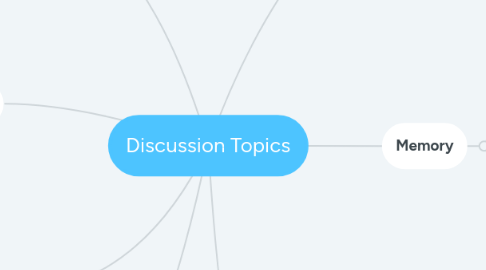
1. Mind Wandering
1.1. Not a waste of time.
1.2. Lack of mind wandering causes lack of creative insight in newer generations.
1.3. Not mind wandering can prevent people from discovering potential solutions or ideas.
2. Multitasking
2.1. No such thing as multitasking.
2.2. The brain can only handle one heavy cognitive load at a time.
2.2.1. The brain only has a certain amount of energy it can devote to attention or focusing on tasks.
2.3. The brain also adapts to what it does most.
2.3.1. This means that heavy cognitive loads can become light with lots of practice.
2.4. Not multitasking can cause tasks to take up more time, but it will also ensure more focus.
3. Technology
3.1. Contributes to lack of attention
3.1.1. People will often pay more attention to devices than other people or lectures.
3.2. Contributes to people having less time for mind wandering.
3.2.1. Now when people are alone, they look at their phones instead of think.
3.3. Changes the brain by impacting attention.
4. Heuristics
4.1. The mental shortcuts that our brains use.
4.1.1. AKA "jumping to conclusions"
4.2. Easier for our brains to process, but can cause a lot of problems if the assumptions are wrong.
5. Attention
5.1. One of the 2 pillars of learning.
5.2. Attention as saliency from a perception perspective.
5.2.1. Specifically: What calls your brain's attention?
5.2.1.1. Visuals - such as colors or things that are large in size.
5.2.1.2. Loud sounds, strong tastes, painful feeling, strong smells. 5 senses.
5.3. Selective attention: "Bottleneck"
5.3.1. As shown in the video where people don't see the gorilla because they're paying attention to counting the passes.
5.4. Attention bias to threat
5.4.1. It's easier to get messages across with fear.
5.5. Attention Deficit (Hyperactivity) Disorder
5.5.1. Everyone has issues with attention, but not quite as much as people with ADHD.
5.6. Attention span
5.6.1. You can extend attention span by changing person, place or topic.
5.7. Attentional networks
5.7.1. People have multiple attention systems.
5.8. Attention blindness
5.8.1. It's easy to block out surroundings while focusing on one thing. Also shown in the gorilla video.
6. Memory
6.1. One of the 2 pillars of learning.
6.2. Writing extends fragile memory
6.2.1. Writing by hand extends memory more than typing on a keyboard
6.2.2. It's better to write a little bit than nothing at all.
7. Reflection
7.1. 3-2-1 Reflection about the discussion
7.1.1. 3 things that are new
7.1.1.1. I didn't know that the brain can only handle one cognitive load at a time.
7.1.1.2. I didn't know that a lack of mind wandering correlates to a lack of creative insight.
7.1.1.3. I didn't know that your brain only has a certain amount of energy it can devote to attention.
7.1.2. 2 things that are so interesting that you continue to research or share with someone else
7.1.2.1. It's interesting that mind wandering can have such a positive effect when I feel like it's mostly thought of as negative.
7.1.2.1.1. For example: mind wandering in class instead of paying attention.
7.1.2.2. It's interesting that there are methods to lengthen attention span.
7.1.2.2.1. Such as: changing topic, person or place.
7.1.3. 1 thing you will change in practice thanks to the information shared in this discussion
7.1.3.1. I'll try to make my mind wander more often when I'm alone and not busy with anything instead of looking through my phone.
